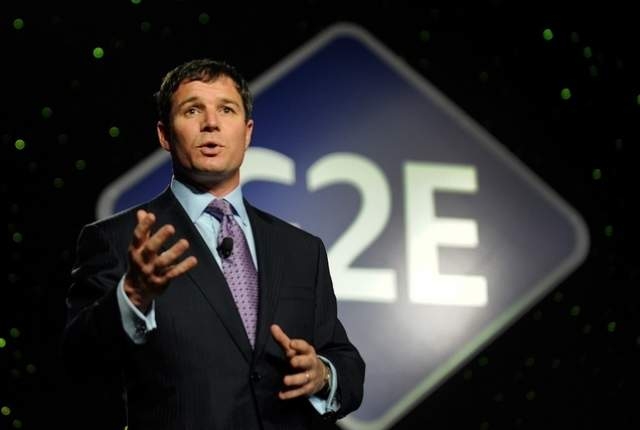Gaming lobbyist group expands in membership, influence

Inside the American Gaming Association’s new headquarters in Washington are a few slot machines to entertain policymakers and other visitors. The free-play games also serve as instructional tools to teach gambling novices about the inner-workings of the casino industry.
A large poker table is on order.
No word yet on house rules.
The offices also feature a sports ticker, a personal favorite of association CEO and die-hard Green Bay Packers fan Geoff Freeman. The ticker provides point spreads on upcoming games and live scores of games in progress.
Located on Ninth Street near Chinatown — a quick subway ride to Capitol Hill — the new space offers the association a little more room, which is a good thing.
The American Gaming Association is expanding both in membership and influence.
Last week, it announced it added nine members, including Seminole Hard Rock Gaming — the group’s first American Indian-owned casino company — and the Las Vegas Convention and Visitors Authority.
“The organization needs to be more transparent, more inclusive and more contemporary,” said Freeman, 40, who became the group’s second CEO in July 2013.
Freeman never understood why the commercial casino industry and the Indian gaming community operated separately. There were differences in operational structure, but the issues they faced were similar.
“This will ensure gaming industry unity on key matters and will elevate the AGA’s ability to be an advocate for the entire gaming industry,” Freeman said.
The American Gaming Association — the industry’s primary trade organization and Capitol Hill lobbyist — changed direction in the past year. Rather than being reactive, it ratcheted up the proactive activities to clear up misconceptions and untruths about the regulated industry.
Last year, it launched its “Get to Know Gaming” effort, which touted the financial benefits the industry brings to the 40 states with commercial and tribal casinos. A study conducted by the research arm of Oxford University showed casinos had an annual economic impact of $240 billion, provided $38 billion in taxes, and supported more than 1.7 million jobs.
In November, the organization stepped up efforts to help casinos comply with federal money-laundering prevention measures. In the coming months, the AGA will have conversations with the industry about the best course of action on legalized sports wagering.
Freeman said the addition of the Florida-based Seminole Tribe, which operates seven casinos in the Sunshine State and Hard Rock-branded resorts worldwide, marked the most consequential change in its structure since it was created in 1995.
Since taking over, Freeman said he spoke with the leadership of more than a dozen tribal gaming companies. He expects other tribes with casinos to join the association in coming months. His goal is for it to represent all licensed and legally operating casinos and gaming equipment manufacturers in the United States.
Freeman knows there is not always going to be unanimity and agreement.
The commercial casino industry often is divided on matters concerning expansion and issues such as Internet gaming. Tribal casino operators are no different. One only has to look to California to see the split among Indian casino companies on similar topics.
But there is strength in numbers, especially on matters of an industrywide level. That’s why the association board will add six members: the Seminole Tribe, the Las Vegas Convention Authority, sports book operators CG Technology and William Hill, slot maker Konami Gaming and Pennsylvania casino operator Greenwood Racing.
American Gaming Association board Chairman Jim Murren, chairman and CEO of MGM Resorts International, said the group needed to expand its membership beyond commercial casinos and gaming equipment suppliers.
“The gaming industry is strongest when it works together,” Murren said.
Freeman hopes the Las Vegas Convention and Visitors Authority will provide the impetus for other tourism boards in cities with casinos to join the gaming association in a membership category that includes financial institutions, vendors, destinations and state associations.
Convention Authority President Rossi Ralenkotter said the tourism group has worked to expand its footprint into the advocacy side. Any issue involving gaming somehow touches Las Vegas.
“This is an opportunity for us to bring any issues we have to their board,” Ralenkotter said. “We bring in a different perspective from the marketing and branding side.”
Freeman, who came to the gaming group from the U.S. Travel Association, once worked in the health insurance industry. There aren’t many bells and whistles to entertain policymakers from that business. He said the new office, with its mini-casino look, displays the industry’s “vibrant, appealing and fun” environment.
“The new space demonstrates our pride in the gaming industry and provides a unique opportunity to celebrate the industry with media, members of Congress and other opinion leaders,” Freeman said. “We are proud of the many benefits the gaming industry provides.”
Howard Stutz’s Inside Gaming column appears Wednesdays and Sundays. He can be reached at hstutz@reviewjournal.com or 702-477-3871. Find him on Twitter: @howardstutz.












